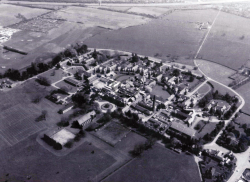Difference between revisions of "Carlton Hayes Hospital"
m |
m |
||
| Line 1: | Line 1: | ||
{{infobox institution | {{infobox institution | ||
| name = Carlton Hayes Hospital | | name = Carlton Hayes Hospital | ||
| − | | image = | + | | image = leicestershirecountyasylum5.png |
| image_size = 250px | | image_size = 250px | ||
| alt = | | alt = | ||
| caption = | | caption = | ||
| established = | | established = | ||
| − | | construction_began = | + | | construction_began = 1904 |
| construction_ended = | | construction_ended = | ||
| − | | opened = | + | | opened = 1907 |
| − | | closed = | + | | closed = 2013 |
| demolished = | | demolished = | ||
| current_status = [[Demolished Institution|Demolished]] | | current_status = [[Demolished Institution|Demolished]] | ||
| building_style = [[Echelon Plan Institutions|Echelon Plan]] (Compact Arrow) | | building_style = [[Echelon Plan Institutions|Echelon Plan]] (Compact Arrow) | ||
| architect(s) = S.P. Pick | | architect(s) = S.P. Pick | ||
| − | | location = | + | | location = Narborough, Leicester |
| architecture_style = | | architecture_style = | ||
| peak_patient_population = | | peak_patient_population = | ||
| alternate_names =<br> | | alternate_names =<br> | ||
*Leicestershire and Rutland Asylum | *Leicestershire and Rutland Asylum | ||
| + | *Leicestershire and Rutland Mental Hospital | ||
}} | }} | ||
==History== | ==History== | ||
| − | The | + | The official opening of the new asylum took place on 1st October 1907, but it was not ready for patients until the spring. The pauper patients were transferred in February and March 1908, with the charity patients following in August and September. In 1914 the name of the new asylum at Narborough was modernised to become the Leicestershire and Rutland Mental Hospital and in 1939 it was changed again to Carlton Hayes Hospital. The hospital continued to be administered by the two County Councils and the Charity until it became part of the National Health Service in 1948. |
| + | |||
| + | It finally closed in 2013 when the site was purchased by Alliance and Leicester for their new headquarters. As well as serving the needs of over 900 patients at any one time it also provided both paid and voluntary employment for many local residents. The hospital also had a active social scene with thriving badminton, bowling and cricket clubs. | ||
| + | |||
| + | ==Images== | ||
| + | <gallery> | ||
| + | File:leicestershirecountyasylum2nd.png | ||
| + | File:leicestershirecountyasylummap.png | ||
| + | </gallery> | ||
==Cemetery== | ==Cemetery== | ||
Latest revision as of 01:08, 25 February 2015
| Carlton Hayes Hospital | |
|---|---|
 | |
| Construction Began | 1904 |
| Opened | 1907 |
| Closed | 2013 |
| Current Status | Demolished |
| Building Style | Echelon Plan (Compact Arrow) |
| Architect(s) | S.P. Pick |
| Location | Narborough, Leicester |
| Alternate Names |
|
History[edit]
The official opening of the new asylum took place on 1st October 1907, but it was not ready for patients until the spring. The pauper patients were transferred in February and March 1908, with the charity patients following in August and September. In 1914 the name of the new asylum at Narborough was modernised to become the Leicestershire and Rutland Mental Hospital and in 1939 it was changed again to Carlton Hayes Hospital. The hospital continued to be administered by the two County Councils and the Charity until it became part of the National Health Service in 1948.
It finally closed in 2013 when the site was purchased by Alliance and Leicester for their new headquarters. As well as serving the needs of over 900 patients at any one time it also provided both paid and voluntary employment for many local residents. The hospital also had a active social scene with thriving badminton, bowling and cricket clubs.
Images[edit]
Cemetery[edit]
Between 1908 and 1994, a reserved section of Narborough Cemetery was used for the interment of many of the patients who died at the hospital. Unfortunately, almost all of the 1,500 graves are unmarked.

